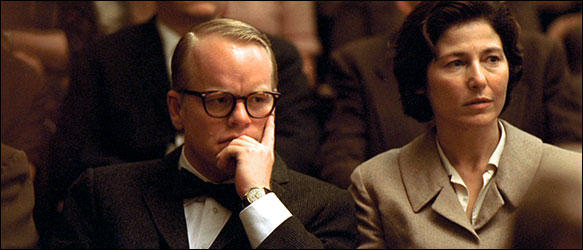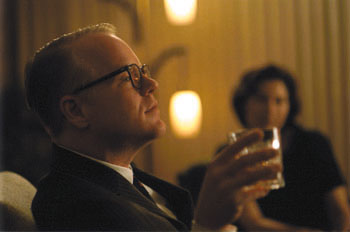By way of Cliopatria, the folks at Crooked Timber have held another online sci-fi symposium akin to their earlier one on China Mieville’s Iron Council. This time the subject is Susanna Clarke’s Jonathan Strange & Mr. Norrell, and the respondents include John Quiggin, Maria Farrell, Belle Waring, John Holbo, Henry Farrell, and — finally — Susanna Clarke.
Category: Authors
The Truman Show.

“Ever since I was a child, folks have thought they had me pegged, because of the way I am, the way I talk. And they’re always wrong.” Capote, starring Philip Seymour Hoffman, is a somber and compelling character study of the eponymous author, during the six years he spent in Kansas researching his renowned “non-fiction novel” of true crime, In Cold Blood. It’s a slow-moving film, but a memorable one. I don’t think I’d want to sit through it again anytime soon, but I do expect it’ll be on the short list for Best Actor nods come awards time.
To be honest, I have no memory or sense at all of Truman Capote, so I can only assume that Hoffman’s performance here, with his fey, lilting voice and precise, carefully-constructed mannerisms, is of a piece with the real author. Regardless, Hoffman’s Capote cuts a complex and striking figure that’s hard to take your eyes from — He’s at once vainglorious and needy, extroverted and remote, compassionate and manipulative, convivial and detestable. Intrigued by a newsclipping of four brutal 1959 murders, he and childhood friend Harper Lee (Catherine Keener) venture to the stark landscape of Holcolmb, Kansas, to investigate. Capote soon realizes that that story of the murders could make for a new kind of novel. But, as he comes to befriend the killers — most notably Perry Edward Smith (Clifton Collins, Jr.) — he also discovers that the problem with writing a non-fiction novel is that the characters have lives of their own, and events may not follow the path you necessarily intend.
This is Hoffman’s film through-and-through, and, like I said (sorry, David Strathairn), I expect that he’ll be a tough act to beat come awards season. Still, Capote is also anchored by a strong sense of place and by many fine supporting performances — most notably Collins and Keener — but also Chris Cooper, Bruce Greenwood, Bob Balaban, and The Wire‘s Amy Ryan. Strangely enough, Capote also bookends nicely with last week’s Jarhead, and crystallizes some of my problems with that film. While we were supposed to feel for Pvt. Swofford’s predicament that he’s gone to war and (sniff) can’t actually kill anybody, this film shows the devastating emotional consequences of a not-unrelated predicament — Capote can’t finish his work of genius until “the story ends,” so to speak. And, as Hoffman emphatically illustrates by the end of this powerful film, “More tears are shed over answered prayers than unanswered ones.”

America Embraces Room 101.
As the Cheney-Addington gang work to strip the Geneva Convention from prisoner treatment manuals, the Washington Post uncovers an overseas network of CIA “black sites,” a.k.a. gulags, some of which actually use old Soviet compounds in Eastern Europe(!) “It is illegal for the government to hold prisoners in such isolation in secret prisons in the United States, which is why the CIA placed them overseas…Legal experts and intelligence officials said that the CIA’s internment practices also would be considered illegal under the laws of several host countries, where detainees have rights to have a lawyer or to mount a defense against allegations of wrongdoing.”
Whatsmore, these gulags, created under this administration since 9/11, “were built and are maintained with congressionally appropriated funds, but the White House has refused to allow the CIA to brief anyone except the House and Senate intelligence committees’ chairmen and vice chairmen on the program’s generalities.” There’s no other way to look at this: By appropriating the tactics of our enemies, as John McCain warned earlier this month, we have abandoned our most fundamental principles and shamed our nation. Evildoers? Please. Dubya need look no further than his own White House and CIA. Update: Congress and the EU want answers.
Queen of the Blessed?
“‘I promised,’ she says, ‘that from now on I would write only for the Lord.’ It’s the most startling public turnaround since Bob Dylan’s ‘Slow Train Coming’.” Goth-lit-queen Anne Rice has been born again, and it doesn’t involve coffins or blood transfusions. Indeed, she’s now apparently halfway through a trilogy on the life of Christ, “the ultimate supernatural hero… the ultimate immortal of them all“…but she notes it won’t be like Left Behind.
Googlarians unite.
“What’s going on? Google has become the new ground zero for the ‘other’ culture war. Not the one between Ralph Reed and Timothy Leary, but the war between Silicon Valley and Hollywood; California’s cultural civil war. At stake are two different visions of what might best promote authorship in this country. One side trumpets the culture of authorial exposure, the other urges the culture of authorial control.” University of Virginia Law professor Tim Wu surveys the controversy over Google Print, and makes a cautious plea for writers and academics to get behind the project.
Blood, sweat, and dust.
In the trailer bin, Philip Seymour Hoffman channels In Cold Blood-era Truman Capote — I presume that’s how he actually sounded — in the preview for Capote, also with Catherine Keener and Chris Cooper. Elsewhere, 1880s Aussie Guy Pearce gets an offer he probably should refuse in The Proposition, written by Nick Cave and also starring Ray Winstone, John Hurt, Danny Houston, David Wenham, and Emily Watson. Finally, I should’ve posted this before, but only now found it: the trailer for Martin Scorsese’s Dylan-doc No Direction Home, appearing on PBS Sept. 26th and 27th.
Pirates, Barbary and Otherwise.
“What is needed now is a framework for an international crime of terrorism…Coming up with such a framework would perhaps seem impossible, except that one already exists…The ongoing war against pirates is the only known example of state vs. nonstate conflict until the advent of the war on terror, and its history is long and notable. More important, there are enormous potential benefits of applying this legal definition to contemporary terrorism.” Via Breaching the Web, author Douglas Burgess makes an intriguing case in Legal Affairs for using long-standing anti-piracy laws to fight terrorism. Definitely worth a read, and not only because I have pirates-on-the-brain after finishing the literary (and highly-condensable) exploits of Jack Shaftoe, King of the Vagabonds earlier this week.)
A Long Way from the Shire.
In the trailer bin, Elijah Wood pulls double duty delving into strange and exotic Old World cultures in the trailers for Green Street (nee Hooligans) and the Liev Schreiber-directed version of Jonathan Foer’s Everything is Illuminated. Of these two, I think I’d rather see the former.
Harry Potter and the Doppelganger Scribes.
“Forgive me, he had it coming…so beardy and so old.” By way of LinkMachineGo, the Guardian accepts rewrites of the climactic moment of Half-Blood Prince in the style of various famous authors. Some of these are really funny. [Massive book spoilers, obviously]
Rabbit Run.
 By way of Cliopatria, What book are you? Sixty-four different choices, and they aren’t as readily guessable as in most online quizzes. As it turns out, I’m “Watership Down…Though many think of you as a bit young, even childish, you’re actually incredibly deep and complex. You show people the need to rethink their assumptions, and confront them on everything from how they think to where they build their houses. You might be one of the greatest people of all time. You’d be recognized as such if you weren’t always talking about talking rabbits.” Ah, rabbits.
By way of Cliopatria, What book are you? Sixty-four different choices, and they aren’t as readily guessable as in most online quizzes. As it turns out, I’m “Watership Down…Though many think of you as a bit young, even childish, you’re actually incredibly deep and complex. You show people the need to rethink their assumptions, and confront them on everything from how they think to where they build their houses. You might be one of the greatest people of all time. You’d be recognized as such if you weren’t always talking about talking rabbits.” Ah, rabbits.

